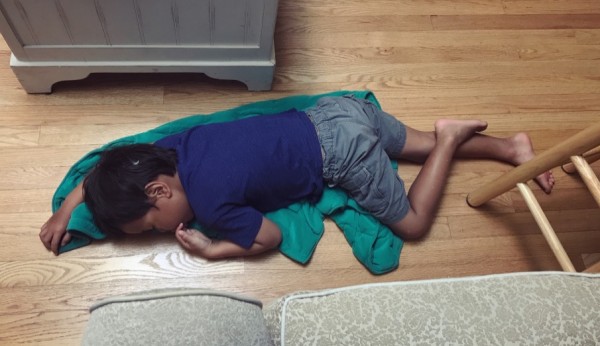Why You Should Have an International Adoption Doctor Review Your Child’s File
I remember the exact moment we got the call. My husband and I were out in our backyard raking leaves and the phone rang. Suddenly all those months of paperwork seemed completely worth it. On the other end of the line was our match-maker, Diane, with the file of a little boy from China. We took a deep breath and answered.
Our initial conversation was brief. Diane would send the paperwork for us to have reviewed and we had 72 hours to make a decision. We eagerly clicked open the file and there he was. Perfect cherub cheeks, bald head, inquisitive eyes. I was in love. But like most international adoptions, our prospective adoptive child had special needs. We carefully read through his medical files, googling every other word. Was this a condition we could handle? What would his prognosis be? And how were we going to make a decision based on a few pages of somewhat adequately translated Chinese medical jargon? That’s when we called our international adoption doctor.
Though my mother had suggested contacting my uncle, an ER doctor, we knew that even with his extensive background in medicine he might not understand the intricacies of adoptive medicine. We knew that children in institutional care could have developmental delays as well conditions (such as Mongolian spots) specific to our child’s region of the world. While a skilled doctor, my uncle didn’t know about the short-term risks of malnourishment, anemia, or potential parasites in institutionalized children. But our international adoption doctor did. And that’s an important distinction.

Doctors who specialize in international adoption medicine have an understanding of overseas medical practices. This means they are better able to interpret your prospective child’s medical paperwork and to read between the lines. As adoption professionals, they also know what to look for in a potential referral. Simple photographs can detect Fetal Alcohol Syndrome and videos of a child doing an everyday task (like stacking cups or responding to a whisper) can highlight TORCH infections. A good doctor will be able to take all the pieces (photographs, developmental questions, videos, medical reports) and pull them together to form a comprehensive picture of your prospective child. And most importantly, a good doctor will know what questions to ask.
When we received our son’s file we were confused about the extent of his special need and his long-term prognosis. Our doctor was able to look at his file then respond with a list of questions for us to ask our son’s caregivers. Through these questions, we were able to determine that his condition was one that we had the resources to handle as a family. And it all occurred within China’s 72-hour timeline to review and lock down a file.
But our doctor did more than just review a file. Thanks to her we had an understanding of our son’s future medical needs. Before we traveled we were able to research and line up specialists and we even found a pediatrician who had two adoptive daughters of her own from China. When it came time to travel our doctor called in prescriptions for our son and sent us recommendations for over-the-counter medicines to take with us. While in-country she was available to us 24/7 should anything arise. And when we came home she was the first doctor we saw.
In addition to pre-evaluations, post-adoption evaluations can be crucial. Doctors who specialize in international adoptive medicine will be able to interpret your child’s medical and immunization records and to recommend what inoculations or titers your child may need. They also know of and can test for, parasites and other conditions that a standard pediatrician might overlook or be unaccustomed to seeing. And all those questions about sleep, attachment, and feeding issues you experienced in-country? I guarantee your doctor will provide some life-saving tips during your post-adoption evaluation.

The fees for international adoption medicine specialists range from $400 – $700. A comprehensive list recommended by the American Academy of Pediatrics can be found here. Our doctor was not on this list, so another good place to start is to simply ask your agency. Very often, agencies know of such doctors in the area, and if the doctors have a working relationship with your agency’s country specialist all the better.
It’s important to remember that all referrals are a leap of faith. And all, yes all, referrals will have missing or misinformation in them. But with the help of a good international adoption doctor, navigating the referral process can be easier. And the best part? You will be better prepared to welcome your newest family member home.
Considering adoption? Let us help you on your journey to creating your forever family. Visit Adoption.org or call 1-800-ADOPT-98.





